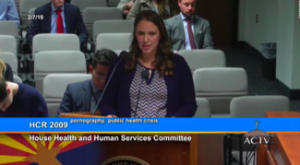Increasingly, state legislatures around the country are taking up the question of pornography as a public health issue. Utah was the first state in the nation to declare pornography a public health crisis in 2016, but measures have been passed in 11 other states since. Arizona has now taken up the debate.
Recently, we reviewed the status of scientific research on the nature of compulsive and obsessive hypersexuality and the role pornography plays in problematic sexual behaviors. The research lags behind the clinical experience as people who are suffering seek help for problematic behaviors. Historically, public health legislation is another trailing indicator that something has gone seriously wrong when it comes to internet pornography.
The dangers of cigarette smoking was perceived as a health hazard by clinicians (physicians, pathologists, nurses, and others) long before legislatures had the political will to address the issue. It is commonly known today that cigarette manufacturers care more about profits than people. They successfully denied the association of tobacco and cancer for decades. Children took up smoking in the confusion caused by the debate over the health effects of tobacco. We now know that the tobacco industry actively used the addictive nature of tobacco to develop and secure future buyers of tobacco products.
We see a similar debate today as manufacturers of pornography deny the influence of their product on healthy psycho-sexual development. Children today take up pornography in a way that is all too reminiscent of the way children started smoking at time when Big Tobacco controlled law-makers.
The state of Arizona is now engaged in the debate. If history is be our teacher, our experience of the tobacco industry suggests the debate will continue for many years to come.
“Like the tobacco industry, the pornography industry has created a public health crisis,” said Arizona state Rep. Michelle Udall. “Pornography is used pervasively, even by minors.” House Concurrent Resolution 2009 says children’s easy access to online porn contributes to “low self-esteem, eating disorders and an increase in problematic sexual activity at ever-younger ages.”
The proposal could set a precedent for future pornography regulation policy.
Read more: Arizona considers calling porn a public health crisis
If you know of someone who may struggle with a sexual addiction and/or a spouse or partner who is suffering from the pain from this behavior, call now for help: 916-728-5433.

